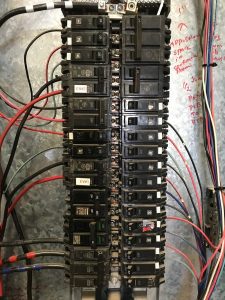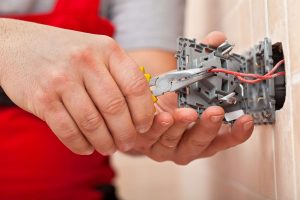 Home wiring is something many homeowners often forget to consider with other home maintenance issues. This is not strange because home electrical wiring is usually tucked away behind the walls. Hence, as long as your outlets work and the lights come on, you won’t be thinking about the wiring behind it all.
Home wiring is something many homeowners often forget to consider with other home maintenance issues. This is not strange because home electrical wiring is usually tucked away behind the walls. Hence, as long as your outlets work and the lights come on, you won’t be thinking about the wiring behind it all.
Contrary to this, it is vital that homeowners place more importance on the status of their electrical wiring. The reasons why doing this is vital are:
- Home wiring provides electricity to the home, and a fault could mean an inefficient or unreliable electrical system.
- Faulty wiring is the most common cause of home electrical fires, which can lead to the loss and destruction of lives and property.
Thankfully, you can avoid being a victim of either of these situations. Electrical problems in the home can easily be detected and fixed before they can do any damage. This means you must learn what to look out for and when it is time to call a professional electrician.
Warning Signs You Need New Wiring
- Dimming or flickering lights
If you have ever experienced this, then you know how frustrating it can be. Dimming and flickering lights occur when the lights are receiving too little voltage or power to function. Now, this might happen occasionally when you plug in a power demanding appliances like a washing machine or blow dryer, but the lights should normalize soon after.However, when dimming and flickering lights become frequent, even in the absence of a power demanding appliance, it is a clear warning sign that something is wrong with the home wiring.
- Tripping breaker
Breakers are designed to switch off automatically when they sense an excessive demand for power that is more than they can provide. This is a safety feature aimed at protecting your home. But when it occurs regularly, it is advisable to call an electrical technician immediately. - Humming outlets or burn marks
Outlets undergo rough and hard treatment in the home. Most people yank at them, jam electrical plugs in, and even try to poke the outlet with different objects. This overuse usually makes an outlet the starting point of an electrical fire. If you observe discoloration, burns, arcs, or a humming/sparking sound from any outlet in the home, call an electrician immediately. This is a very serious sign and must be handled in a timely manner. - A burning smell
The burning smell of an electrical wire is hard to miss. It is sharp and tricky because you may be unable to pinpoint its source. It is a sign of faulty wiring and a looming electrical fire. - Electrical shock
Sometimes when the wiring is damaged, you can experience electrical shocks from outlets. If you receive electrical shocks while plugging or unplugging an electrical device, call for professional help immediately.
Other telltale signs include age of the home and increasing demands for power in the home. All signs of an electrical wiring problem require that you reach out to professionals at The Electric Connection for a new and updated wiring system.





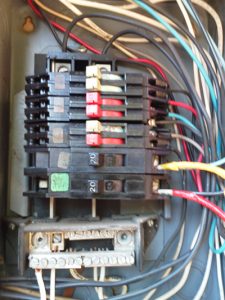 Electrical panels service homes and buildings by providing and controlling power. It is vital that such an important electrical appliance is safe and dependable. When this is not the case, homes and buildings can run into several electrical based problems that range from inefficient electricity supply to fires, electric shocks, and more.
Electrical panels service homes and buildings by providing and controlling power. It is vital that such an important electrical appliance is safe and dependable. When this is not the case, homes and buildings can run into several electrical based problems that range from inefficient electricity supply to fires, electric shocks, and more. 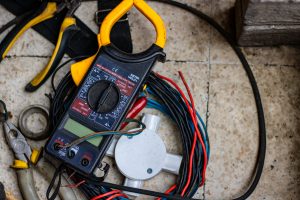 Rewiring is one of the most difficult, messy, and disruptive maintenance projects you can perform in the home. It is equally time-consuming and costly but very necessary. The lifespan of the electrical installation in a home is usually 25 years. However, this duration can vary depending on use. The electrical system will have to be inspected every 10 years if it is in a privately owned property or every 5 years for a rented property. This inspection guarantees electrical safety.
Rewiring is one of the most difficult, messy, and disruptive maintenance projects you can perform in the home. It is equally time-consuming and costly but very necessary. The lifespan of the electrical installation in a home is usually 25 years. However, this duration can vary depending on use. The electrical system will have to be inspected every 10 years if it is in a privately owned property or every 5 years for a rented property. This inspection guarantees electrical safety.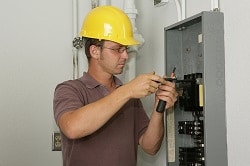 The words ‘electrical contractor and electrician’ are often used interchangeably. Many people do not know the difference between both but assume they mean the same thing. In this article, we will discuss what an electrical contractor does and how they are different from an electrician.
The words ‘electrical contractor and electrician’ are often used interchangeably. Many people do not know the difference between both but assume they mean the same thing. In this article, we will discuss what an electrical contractor does and how they are different from an electrician. 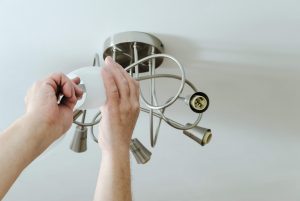 We often see light fixture installations as the easiest tasks of an electrician. Hence, most people try to do them without professional help. A light fixture is described as an electrical device containing an electric lamp. They usually come with an installed switch for users to control the light. For light fixtures to work, they must be connected to a power source. Common examples are your ceiling lights, chandelier, outdoor lights and so on.
We often see light fixture installations as the easiest tasks of an electrician. Hence, most people try to do them without professional help. A light fixture is described as an electrical device containing an electric lamp. They usually come with an installed switch for users to control the light. For light fixtures to work, they must be connected to a power source. Common examples are your ceiling lights, chandelier, outdoor lights and so on. 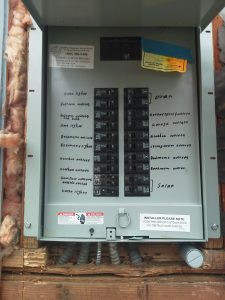 The electrical panel in the home is where your electricity is distributed. Some electrical technicians describe the panel as a box of switches and wires. It is where you can find the individual breakers responsible for sending power to specific parts of the home. Most times when there is an electrical problem, homeowners use these switches to turn off or turn on the power.
The electrical panel in the home is where your electricity is distributed. Some electrical technicians describe the panel as a box of switches and wires. It is where you can find the individual breakers responsible for sending power to specific parts of the home. Most times when there is an electrical problem, homeowners use these switches to turn off or turn on the power. 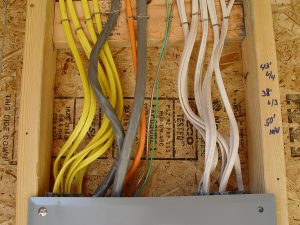
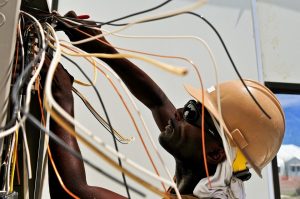 A large number of house fires are attributed to faulty wiring.
A large number of house fires are attributed to faulty wiring. 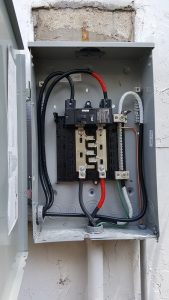 Panel upgrades are large projects. They require the expertise of a professional electrician and a good investment in funds. The electrical panels of a home contribute to its overall efficiency. In this modern age, we all rely so much on power to complete day-to-day activities. This power is distributed by the electrical panel of a home or building.
Panel upgrades are large projects. They require the expertise of a professional electrician and a good investment in funds. The electrical panels of a home contribute to its overall efficiency. In this modern age, we all rely so much on power to complete day-to-day activities. This power is distributed by the electrical panel of a home or building. 